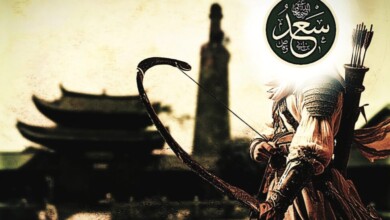Hassan ibn Thabit: The poet of the Prophet
Hassan ibn Thabit ibn Al-Mundhir ibn Haram, an Ansari from the Najjar clan of the Khazraj tribe in Madinah, stands as a monumental figure in Islamic history. His legacy is forever defined by his title: “The Poet of the Prophet Muhammad.” He was the voice that answered the slurs and satires of the enemies of Islam with divinely supported eloquence.
Long before the dawn of Islam, Hassan ibn Thabit was already a poet of great renown, his life and work reflecting the customs of the Jahiliyyah period.
- The voice of his tribe: He served as the dedicated poet for the Ansar, and specifically his tribe, Khazraj. In a time of constant rivalry with the Aws tribe, his poetry was a weapon of tribal loyalty. He engaged in fierce poetic duels with Qais ibn Al-Khatim, the poet of the Aws, using satire (Hija‘) and boasting (Fakhr) to defend his people’s honour and retaliate against any insult.
- A courtier for kings: His fame extended far beyond the confines of Madinah. He was a regular and honoured presence at the Ukaz market, a central stage for the poetic greats of Arabia. His talent earned him the patronage of the Ghassanid kings in Syria, who were his maternal uncles. They provided him with a generous monthly stipend, and in return, he composed masterful panegyrics, praising their virtues and boasting of their lineage and achievements.
- A range of Themes: Like his contemporaries, his poetic repertoire was boundless and adorned with the imagination characteristic of the era, encompassing themes of love, flattery, and the glorification of his patrons.
This extensive career honed his skills to a razor’s edge, making him a master of language, satire, and praise—a tool that would be perfectly repurposed for a divine cause.
Transformation and service in Islam
Hassan ibn Thabit embraced Islam at the age of sixty, a conversion that marked a shift in the purpose and content of his poetry. He channelled his entire artistic prowess into the service of the new faith.
- The Prophet Muhammad recognized the power of poetry as the media of the age—a means of shaping public opinion, uplifting the believers, and dismantling the opposition. He formally appointed Hassan as his poet, granting him a unique status.
- When the Qurayshi polytheists attacked the Muslims with vicious poetry, the Prophet turned to Hassan. He famously instructed him, “Satirize them, and Jibril is with you.” This statement was a promise of divine inspiration, elevating his poetry from mere art to a form of spiritual warfare.
- Such was the importance of his role that the Prophet provided him with a minbar (pulpit) within the mosque itself, from which he would recite his powerful verses in defense of the Muslim community. During critical moments, such as the Battle of the Trench, when the Prophet asked who would rise to defend the Muslims’ honour, it was Hassan who stepped forward.
- His satire was remarkably principled. Mindful that the Prophet was from the Quraysh, he never attacked their lineage. Instead, he masterfully targeted their misguided actions, their rejection of the truth, and their immoral behaviour, thus discrediting their ideology without resorting to baseless insults.
The fact that he did not physically fight in battles was not due to any cowardice, as some might mistakenly claim. He was already over sixty years old when he became a Muslim, an age that made military campaigning impractical. His jihad was fought with his tongue and his pen.
Later life and legacy
Hassan ibn Thabit lived an extraordinarily long life, witnessing the entire early unfolding of Islam. Historians differ on the precise year of his death, with reports suggesting the year 40, 50, or 54 AH. The most prevalent and famous view among Muslim scholars is that he died at the age of one hundred and twenty, having lived sixty years in ignorance and sixty years in Islam, during the caliphate of Muawiyah ibn Abi Sufyan.



